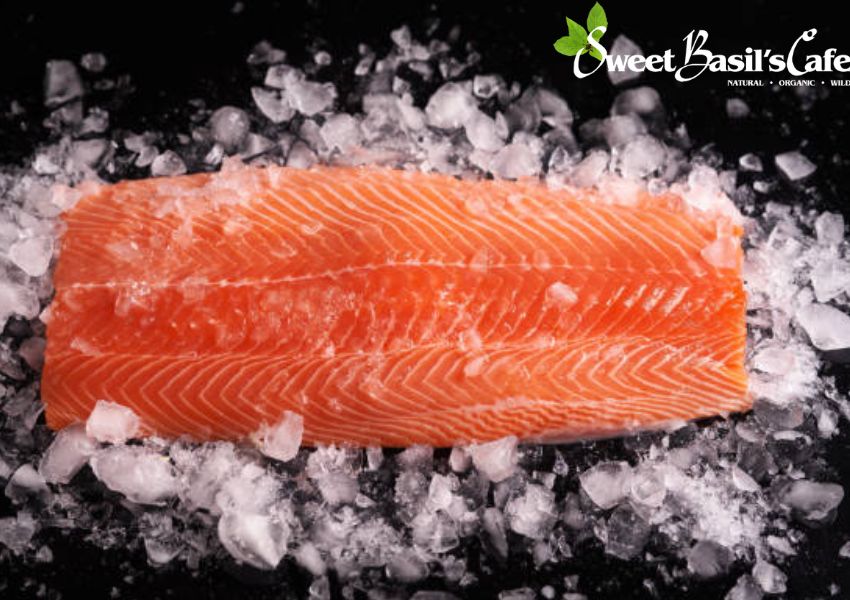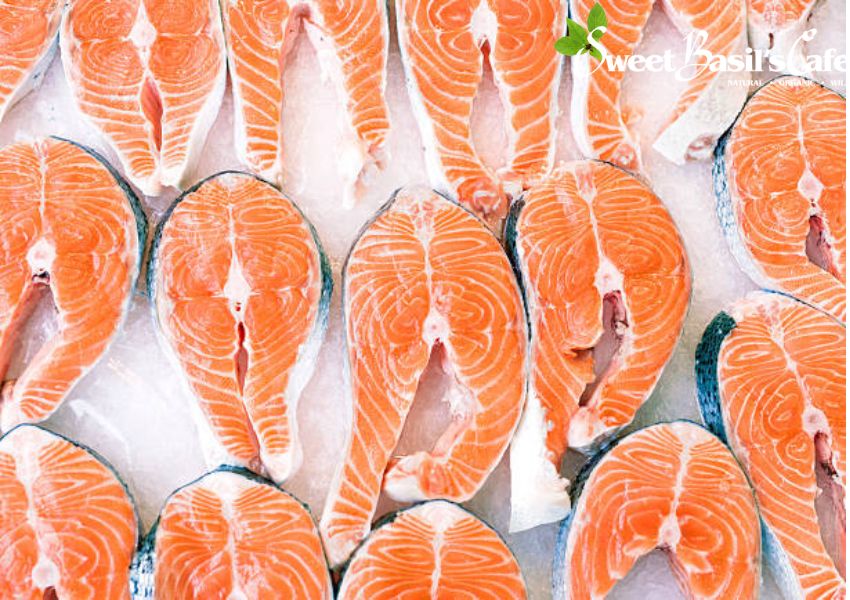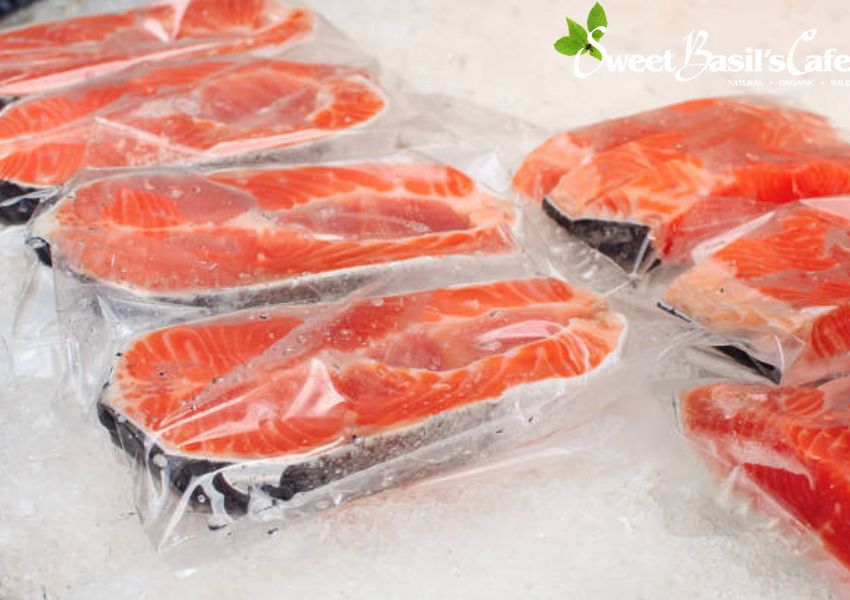How Long Can You Freeze Salmon?

How long can you freeze salmon? Your initial thought might be that freezing salmon limits its shelf life, thus decreasing overall quality – but that isn’t necessarily the case! In this post, we’ll discuss all there is to know about freezing salmon; from longevity in the freezer to thawing methods that don’t compromise its integrity. So whether you’re preparing dinner tonight or stocking up on frozen fish fillets for down the road — keep reading to learn more about what makes your favorite sustainable seafood dish so special!
Can You Freeze Salmon?
- Salmon can be frozen. It can be said that salmon is a flexible fish that can be prepared in a number of different ways and freezes well.
- In actuality, freezing is among the finest ways to keep salmon fresh. Salmon that has been frozen can keep for up to six months if stored properly.
- Before freezing, wrap the salmon firmly in plastic wrap or aluminum foil for the best results. This will keep the fish fresh and help prevent freezer burn.

How Long Can You Freeze Salmon?
Even though salmon is a tasty and nutritious alternative for a quick lunch, sometimes life gets in the way and you need to freeze your salmon for later. But how long may salmon be stored in the freezer without risking spoilage?
Fish may often be stored in the freezer for up to 6 months without losing any quality. Both raw and cooked fish fall under this category. Also, salmon can be stored for 9 to 12 months. Salmon could be stored in the freezer for an extended period of time, but after a year, the quality will start to deteriorate. Depending on the type of salmon, different periods of time can be spent freezing it:
Smoked Salmon:
Yes! Your smoked salmon can be frozen, and it will keep its quality for up to 6 months.
To make thawing and reheating easier, we advise that you split your salmon into amounts that are suitable for meals before freezing.
Your smoked salmon will stay fresh and delectable when kept in a freezer-safe container.
Canned Salmon
Though it’s not the best idea, you can. Since salmon in a can has already been cooked, freezing it would alter its texture and reduce its appeal.
Additionally, salmon is frequently canned in oil, which, when frozen, can separate and get rancid.
For optimal quality, choose canned salmon that you must freeze within a few months. Always heat food completely before consuming it after thawing.
Raw Salmon
The short answer is yes, raw salmon can be frozen. When done correctly, freezing can help your salmon last longer on the shelf and stay fresh for up to 6 months.
Sushi Grade Salmon
Yes, you can freeze it, but first you should be aware of a few things.
Salmon fit for sushi is often made from fresher, better fish than what you would get at your neighborhood grocery shop. It should be used within 2-3 days of purchase as a result of its shortened shelf life.
If you intend to freeze it, make sure to do so as soon as possible after purchasing it and to carefully wrap it in plastic wrap or put it in a freezer bag. Sushi-grade salmon can stay fresh for up to three months when refrigerated properly.
The best time to use it is within the first month or two after freezing because the quality will degrade over time.
Is It Safe To Freeze Salmon?
Salmon can be safely frozen. Salmon is a food that spoils quickly, therefore it must be stored carefully.
The fish’s flesh will not be harmed by ice crystals or bacteria because freezing will stop their growth.
When done properly, freezing can help your salmon last longer on the shelf and stay fresh for up to 6 months.
A More Specific Method Of Freezing Salmon:
- The best approach to freeze salmon is to first carefully wrap it in aluminum foil or plastic wrap. This will keep the fish fresh and help prevent freezer burn.
- The salmon should then be placed in a freezer bag, with as much air removed before the bag is sealed.
- After writing the date and the kind of salmon on the bag, put it in the freezer.
- Use the salmon within six months for the highest quality. Simply let it thaw overnight in the refrigerator before cooking it as directed when you’re ready.
Can You Eat Salmon That’s Been Frozen For A Year?
Salmon that has been frozen for a year is theoretically edible, but it won’t be as good as fresh salmon. The fish will likely be rough and dry, and the texture and flavor will have changed.
The best course of action is to discard any old fish that you’re unsure how to prepare. You’ll be much happier with a fresh, tasty piece of salmon than it is to take the chance of getting food illness.
How To Freeze Salmon Properly?
The short thawing time of salmon is one of its main advantages. So salmon is a great option if you’re hungry in the middle of the night and want to eat something nutritious. Here is a quick tutorial on how to properly freeze salmon.
Instructions:
- Start by selecting the freshest, most high-quality salmon you can find.
- Carefully clean and fillet it, removing any bones or skin as desired.
- Wrap each piece of salmon tightly in plastic wrap or aluminum foil, making sure there are no air pockets inside the package that could dry out the fish.
- Place the wrapped salmon portions into a freezer-safe bag or container and label it with the date you plan to use it by.
- Put it in the freezer, making sure that temperatures are consistent and set at 0°F (-18°C) or lower.
- Once frozen, the salmon can be stored in the freezer for up to six months.
Video: How To Freeze Salmon Properly
Tips And Reminders:
- The fish must be eaten within six months.
- Use a professional boning knife to cut fish into serving-sized pieces as needed.
- Don’t use sandwich bags. Instead, use freezer bags. For freezing meat, they are thicker and preferable.
- Calculate the quantity of fish in a bag based on how much you typically eat during a meal.
- If you’re ready to defrost, place the necessary quantity in the refrigerator and leave overnight.
- Roll the fish-filled freezer bag tightly.
Dry the fish as carefully as possible after defrosting. Salmon that has been defrosted can stay in the refrigerator for two days. You may prolong the quality of your fish by following these instructions.
A More Specific Method of Freezing Salmon:
- There is a more effective method for freezing salmon than the one I mentioned above. It is referred to as ice glazing and will keep your fish in the freezer in good condition.
- Make room in the freezer for a baking tray before anything else. Wait for the fish to freeze by placing it on a tray, unwrapped and exposed, and placing it in the freezer.
- See if the flesh is still malleable. After that, take the salmon out of the freezer, submerge it in cold water, and put it back on the tray. Watch for it to freeze once more.
- Put it back in the freezer after re-soaking it in cold water. Once the fish has a full, robust coating, repeat this process a few times.
How To Thaw Frozen Salmon?
How Should Frozen Salmon Be Thawed? Depending on the time available and the quantity of salmon that has to be thawed, a variety of techniques can be employed to thaw frozen salmon.
Thawing In The Refrigerator (The Safest Method)
The refrigerator is the safest place for salmon to defrost overnight. This method’s progressive pacing inhibits the growth of ice crystals, which could harm the fish’s flesh.
Salmon can be defrosted in the refrigerator by simply putting it in a bag or container and storing it there overnight. Cook the salmon per your recipe the following day.
Thawing In Cold Water (The Quickest Method)
Salmon can be quickly defrosted in cold water. This process is more faster than defrosting in the refrigerator, but it’s crucial to be careful not to leave the fish out at ambient temperature for an extended period of time.
Salmon should be put in a sealable bag and submerged in cold water to defrost. Cook the salmon as soon as it has thawed and change the water every 30 minutes.
Thawing In The Microwave (The Easiest Method)
The microwave is the best option for people who are pressed for time. Salmon may be quickly and easily thawed in the microwave, but it must be cooked right away.
Salmon can be defrosted in the microwave for 1-2 minutes on the “defrost” setting by placing it on a plate. The salmon should defrost for a further 1-2 minutes after being turned over. Cook right away.
Note: Whatever method you select, make sure to prepare the salmon no later than 24 hours after thawing. Refreezing previously frozen salmon is not advised since it increases the risk of bacterial growth.
Can Salmon Go Bad In The Freezer?
Let’s learn about the storage of salmon. Salmon that is properly frozen and stored can last up to six months in the freezer without going bad or spoiling. So, then, can salmon go bad in the freezer? How to know it?
Tasting Bad Salmon
A bad salmon will smell unpleasant and have a slimy texture. Additionally, the fish needs to be thrown out if it has freezer burn or is discolored.
Scent Signs Of Bad Salmon
It’s usually preferable to err on the side of caution and discard salmon if you’re unsure whether it’s bad. Salmon that has gone rotten will taste fishy and nasty, making it unsafe to consume.
Visual Signs Of Bad Salmon
Fresh salmon should smell mildly like the ocean, as with most fish. Salmon that smells fishy, acidic, or ammonia-like has gone bad and should not be consumed.
It’s preferable to be safe and discard the salmon if you’re ever dubious of its freshness. You’ll be much happier with a fresh, tasty piece of salmon than it is to take the chance of getting food illness.
Texture Signs Of Bad Salmon
A bad salmon will smell unpleasant and have a slimy texture. Additionally, the fish needs to be thrown out if it has freezer burn or is discolored.
Common Mistakes When Freezing Salmon
- When storing salmon in the freezer, it’s important to remember that air needs to be kept out of the package. Air can dry out and damage the fish, causing a loss of texture and flavor.
- It’s also essential to keep salmon frozen at 0°F (-17°C) or lower. Any higher temperature will cause bacteria growth. If you are unable to keep the temperature at 0°F (-17°C), it’s best to store the salmon in a freezer-safe container and consume within 24 hours.
- Finally, refreezing previously frozen salmon is not advised since it increases the risk of bacterial growth. With these tips on proper freezing and thawing techniques, you’ll be sure to enjoy the maximum flavor and texture of your salmon.

Frequently Asked Questions Of How To Can You Freeze Salmon
Can You Freeze Canned Salmon Once Opened?
Yes, you can freeze canned salmon once opened. However, it is important to note that the texture and flavor of the fish may change after being frozen.
Does Frozen Salmon Taste Different?
Frozen salmon will generally taste similar to fresh salmon. However, the texture of frozen salmon may be slightly different than that of freshly cooked salmon.
Which Is Healthier Tuna Or Salmon?
Both tuna and salmon are great sources of protein and omega-3 fatty acids. However, some studies have found that wild salmon may be healthier than canned tuna since it has less mercury content.
Can You Eat Salmon Every Day?
Yes, you can eat salmon every day. Salmon is an excellent source of protein and healthy fats and it has a variety of health benefits. However, it is important to note that too much salmon may lead to mercury poisoning or other adverse health effects.
Should I Thaw Frozen Salmon Before Cooking?
Yes, it is best to thaw frozen salmon before cooking. Place the fish in a refrigerator and allow it to thaw for at least 12 hours or up to 24 hours. Once thawed, cook the salmon right away. The safest way to quickly defrost salmon is by submerging it in cold water for about 1-2 minutes and then cooking it immediately.
Why Is My Frozen Salmon Mushy?
Mushy salmon is usually the result of incorrect freezing techniques. If the salmon has been improperly stored in the freezer, it may develop freezer burn and become mushy. It is important to ensure that all air is removed from the packaging before freezing to prevent this.
Why Is My Frozen Salmon Yellow?
Frozen salmon may turn yellow due to oxidation. This happens when the fish is exposed to too much oxygen or light during freezing or thawing. To avoid this, be sure that the salmon is properly packaged and stored in a dark place while thawing.
Does Freezing Salmon Destroy Omega 3?
Freezing salmon can reduce the levels of omega-3 fatty acids, as some of these beneficial nutrients may be lost in the freezing process. To minimize nutrient loss, be sure to store the salmon correctly and consume it within a few days of thawing.
Can You Get Sick From Old Frozen Fish?
Yes, you can get food illness from eating old frozen fish. It is important to check the best-by date on the package before storing and consuming, as well as inspecting the salmon for any signs of spoilage before cooking. If the fish has freezer burn or an unpleasant smell, it should be discarded immediately.
What Happens If You Eat Old Salmon?
Eating old salmon can lead to food poisoning and other illnesses. Symptoms of foodborne illness may include nausea, vomiting, diarrhea, fever, and abdominal cramps. It is important to always check the best-by date on the packaging and discard any fish that appears spoiled or has freezer burn.
Conclusion
Now that you know how long can you freeze salmon. It can be said that you can freeze salmon for up to two months and still enjoy its fresh taste. f you follow these guidelines, your salmon should stay fresh for up to 2-3 months. By following these simple tips, you can keep your salmon tasting great for weeks to come. So next time you’re at the store, be sure to pick up an extra package or two of salmon. Sweet Basil’s Cafe hopes it helps you. Thanks for reading.
